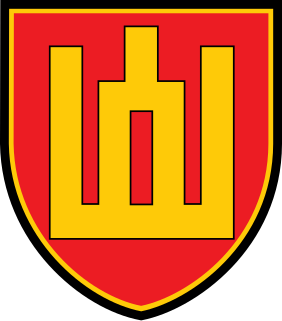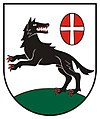
Belarus, officially the Republic of Belarus, is a landlocked country in Eastern Europe. It is bordered by Russia to the east and northeast, Ukraine to the south, Poland to the west, and Lithuania and Latvia to the northwest. Belarus covers an area of 207,600 square kilometres (80,200 sq mi), with a population of 9.4 million, and is the thirteenth-largest and the twentieth-most populous country in Europe. The country is administratively divided into seven regions, and is one of the world's most urbanized, with over 40% of its total land area forested. Minsk is the country's capital and largest city.

Lithuania, officially the Republic of Lithuania, is a country in the Baltic region of Europe. Lithuania is one of the Baltic states. Situated on the eastern shore of the Baltic Sea, to the southeast of Sweden and Denmark, Lithuania is bordered by Latvia to the north, Belarus to the east and south, Poland to the south, and Kaliningrad Oblast to the southwest. Lithuania has an estimated population of 2.8 million people as of 2019. The capital and largest city is Vilnius and other major cities are Kaunas and Klaipėda. Lithuanians are Balts. The official language, Lithuanian, is one of only two living languages in the Baltic branch of the Indo-European language family, the other being Latvian.

This article is about the demographic features of the population of Lithuania, including population density, ethnicity, level of education, health, economic status, and religious affiliations.

The Lithuanian Armed Forces consist of 20,565 active personnel. Conscription was ended in September 2008 but reintroduced in 2015 because of concerns about the geopolitical environment in light of Russia's military intervention in Ukraine.

Vilnius is the capital of Lithuania and its largest city, with a population of 587,581 as of 2019. The population of Vilnius's functional urban area, which stretches beyond the city limits, is estimated at 706,832, while according to the Vilnius territorial health insurance fund, there were 732,421 permanent inhabitants as of October 2020 in Vilnius city and Vilnius district municipalities combined. Vilnius is in southeastern Lithuania and is the second-largest city in the Baltic states. It is the seat of Lithuania's national government and the Vilnius District Municipality.

Kaunas is the second-largest city in Lithuania after Vilnius and an important centre of Lithuanian economic, academic, and cultural life. Kaunas was the biggest city and the centre of a county in the Duchy of Trakai of the Grand Duchy of Lithuania and Trakai Palatinate since 1413. In the Russian Empire, it was the capital of the Kaunas Governorate from 1843 to 1915.

The Baltic states, also known as the Baltic countries, Baltic republics, Baltic nations, or simply the Baltics, is a geopolitical term, typically used to group the three sovereign states on the eastern coast of the Baltic Sea: Estonia, Latvia, and Lithuania. The term is not used in the context of cultural areas, national identity, or language, because while the majority of people in Latvia and Lithuania are Baltic people, the majority in Estonia are Finnic. The three countries do not form an official union, but engage in intergovernmental and parliamentary cooperation. The most important areas of cooperation among the three countries are foreign and security policy, defence, energy, and transportation.

The Polish–Lithuanian Commonwealth, formally known as the Crown of the Kingdom of Poland and the Grand Duchy of Lithuania and, after 1791, the Commonwealth of Poland, was a country and bi-federation of Poland and Lithuania ruled by a common monarch in real union, who was both King of Poland and Grand Duke of Lithuania. It was one of the largest and most populous countries of 16th- to 17th-century Europe. At its largest territorial extent, in the early 17th century, the Commonwealth covered almost 1,000,000 square kilometres (400,000 sq mi) and as of 1618 sustained a multi-ethnic population of almost 12 million. Polish and Latin were the two co-official languages.

The Grand Duchy of Lithuania was a European state that lasted from the 13th century to 1795, when the territory was partitioned among the Russian Empire, the Kingdom of Prussia and Austria. The state was founded by the Lithuanians, a polytheistic nation born from several united Baltic tribes from Aukštaitija.

The Lithuanian Soviet Socialist Republic, also known as Soviet Lithuania or Lithuania, was one of the constituent republics of the USSR between 1940–1941 and 1944–1990. After 1946, its territory and borders mirrored those of today's Republic of Lithuania, with the exception of minor adjustments of the border with Belarus.

Lithuanians are a Baltic ethnic group. They are native to Lithuania, where they number around 2,561,300 people. Another million or more make up the Lithuanian diaspora, largely found in countries such as the United States, Argentina, Brazil, Canada, Colombia, Russia, United Kingdom and Ireland. Their native language is Lithuanian, one of only two surviving members of the Baltic language family. According to the census conducted in 2001, 83.45% of the population of Lithuania identified themselves as Lithuanians, 6.74% as Poles, 6.31% as Russians, 1.23% as Belarusians, and 2.27% as members of other ethnic groups. Most Lithuanians belong to the Roman Catholic Church, while the Lietuvininkai who lived in the northern part of East Prussia prior to World War II, were mostly Evangelical Lutherans.

Vilnius University is the oldest university in the Baltic states, one of the oldest and most famous in Eastern Europe, preceded only by the universities of Prague, Kraków, Pécs, Budapest, Bratislava and Königsberg. Today it is the largest university in Lithuania.

Lithuania is divided into three layers of administrative divisions. The first-level division consists of 10 counties. These are sub-divided into 60 municipalities, which in turn are further sub-divided into over 500 smaller groups, known as elderships.

The January Events took place in Lithuania between 11 and 13 January 1991 in the aftermath of the Act of the Re-Establishment of the State of Lithuania. As a result of Soviet military actions, 14 civilians were killed and 702 were injured. The events were centered in its capital, Vilnius, along with related actions in its suburbs and in the cities of Alytus, Šiauliai, Varėna, and Kaunas.

EuroBasket 2011 was the 37th men's European Basketball Championship, held by FIBA Europe. The competition was hosted by Lithuania. This was the second time EuroBasket had been held in Lithuania, the country having also hosted the 1939 championship. FIBA Europe asserted that Lithuania managed to organize the best European championship in its history. The top two teams are guaranteed spots at the 2012 Summer Olympics.
Romualda Hofertienė was a Lithuanian politician. In 1990 she was among those who signed the Act of the Re-Establishment of the State of Lithuania.
The 2011 A Lyga was the 22nd season of the A Lyga, the top-tier football league of Lithuania. The season began on 12 March 2011 and ended on 6 November 2011. Ekranas were the defending champions, having won their third consecutive title at the end of the 2010 season.
The 2012 A Lyga, also known as General Financing A Lyga for sponsoring purposes, was the 23rd season of the A Lyga, the top-tier football league of Lithuania. The season started on 10 March 2012 and ended on 11 November 2012. Ekranas were the defending champions.

Aleksandras Fromas known by his pen name Gužutis (1822–1900) was a Lithuanian writer, one of the first authors of Lithuanian plays and dramas.



















